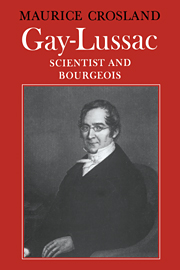Book contents
- Frontmatter
- Contents
- Preface
- Chronological table
- List of abbreviations
- 1 A young provincial in Paris
- 2 The apprentice of Arcueil
- 3 Personal influences and the search for laws
- 4 Collaboration and rivalry
- 5 The volumetric approach
- 6 Scientific research
- 7 Professor, Academician and editor
- 8 A scientist in the service of government and industry
- 9 A new technique and the dissemination of technical information
- 10 Scientist and bourgeois in the political arena
- 11 The legacy
- Appendix: select correspondence
- Notes
- Select bibliography
- Name index
- Subject index
4 - Collaboration and rivalry
Published online by Cambridge University Press: 03 November 2009
- Frontmatter
- Contents
- Preface
- Chronological table
- List of abbreviations
- 1 A young provincial in Paris
- 2 The apprentice of Arcueil
- 3 Personal influences and the search for laws
- 4 Collaboration and rivalry
- 5 The volumetric approach
- 6 Scientific research
- 7 Professor, Academician and editor
- 8 A scientist in the service of government and industry
- 9 A new technique and the dissemination of technical information
- 10 Scientist and bourgeois in the political arena
- 11 The legacy
- Appendix: select correspondence
- Notes
- Select bibliography
- Name index
- Subject index
Summary
‘A discovery is the product of a previous discovery and in its turn it will give rise to a further discovery’
Gay-Lussac‘In order to draw any conclusion…it is prudent to wait until more numerous and exact observations have provided a solid foundation on which we may build a rigorous theory’
Gay-LussacThe ‘chemical revolution’ of the late eighteenth century had the effect not only of expanding the field of scientific endeavour but of focussing the attention of bright young men of the time on that particular branch of science.
Within three years of the year of birth of Gay-Lussac (1778) there were born four other men who were each to establish a considerable reputation for themselves in chemical science: Amedeo Avogadro (1776–1856), Jöns Jacob Berzelius (1779–1848), Humphry Davy (1778–1829) and Louis Jacques Thenard (1777–1857). All came to have a great respect for Gay-Lussac although most of them had little direct contact with him. Most remote was Avogadro, on the far side of the Alps condemned to obscurity and isolation from the main centres of scientific research and publication. Yet Avogadro's great claim to fame (‘Avogadro's hypothesis’) is a direct inference from the Frenchman's law of combining volumes of gases, a connection fully and explicitly acknowledged by the Italian. The Swede, Berzelius, too was to derive inspiration from the publications of Gay-Lussac, whom he was to meet during his stay in Paris in 1818–19.
- Type
- Chapter
- Information
- Gay-LussacScientist and Bourgeois, pp. 71 - 91Publisher: Cambridge University PressPrint publication year: 1978
- 1
- Cited by



